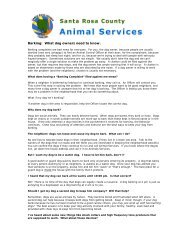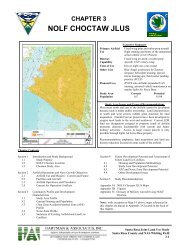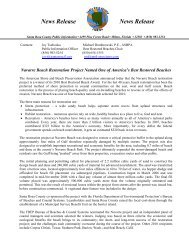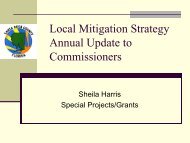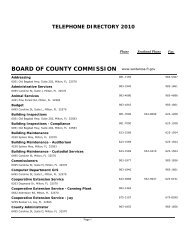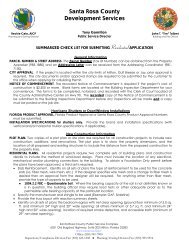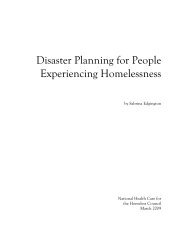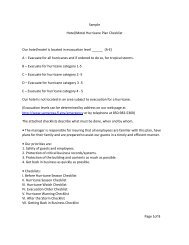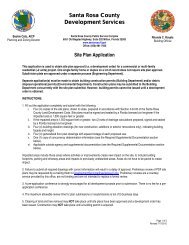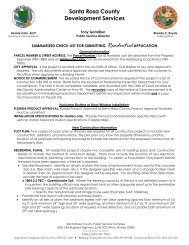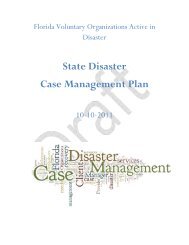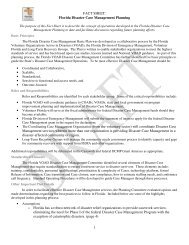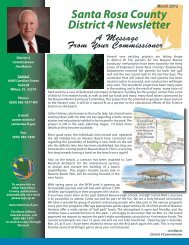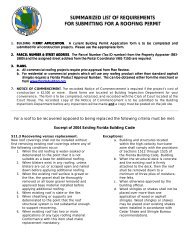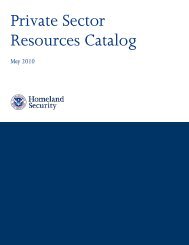Disaster - Santa Rosa County
Disaster - Santa Rosa County
Disaster - Santa Rosa County
You also want an ePaper? Increase the reach of your titles
YUMPU automatically turns print PDFs into web optimized ePapers that Google loves.
When hurricanes,<br />
severe weather<br />
and other natural<br />
disasters threaten<br />
Florida, a free<br />
phone call to 511<br />
provides travel<br />
information and<br />
roadway conditions.<br />
What to do During a Hurricane<br />
• Remain in an interior hallway, bathroom or closet on the lowest level of a structure away<br />
from windows.<br />
• Keep disaster kit handy.<br />
• Close all interior doors and brace exterior doors if possible.<br />
• If the eye of the storm passes over, it will be calm for a short period of time. REMAIN<br />
INDOORS! As soon as the eye passes over, winds will increase rapidly to hurricane force<br />
from the opposite direction.<br />
• Remain calm. It may take several hours for the storm to pass.<br />
• Monitor radio and TV for current information.<br />
28<br />
Hurricanes<br />
What to do After a Hurricane<br />
• Monitor radio and TV for current information.<br />
• Be aware of any boil water notices and avoid unsafe<br />
food.<br />
• If home is safe make temporary repairs if required. Take<br />
pictures of damage.<br />
• Check on neighbors.<br />
• If you evacuated, return home only when authorities<br />
advise that it is safe.<br />
• Drive only if it is absolutely necessary. Immediately<br />
following the passage of the storm, debris may be<br />
covering roadways making them impassable. Emergency<br />
crews will be working to clear roadways but it may take<br />
hours or even days to clear them all. Avoid sightseeing;<br />
water from vehicles sends wakes into others’ property.<br />
Roads may be closed for your protection, so if you<br />
encounter a barricade, turn around and go another way.<br />
• Do not drive in flooded areas. Avoid weakened bridges<br />
and washed out roadways.<br />
• Stay on firm ground. Moving water only six inches deep<br />
can sweep you off your feet. Standing water may be<br />
electrically charged from downed power lines.<br />
• Beware of downed power lines. Lines may be charged<br />
and dangerous.<br />
• Beware of snakes, insects or animals driven to higher<br />
ground.<br />
• Enter your home with extreme caution. Beware of fallen<br />
objects or damaged roof and wall sections.<br />
• Remove shutters or plywood and open windows and<br />
doors to ventilate or dry your home if necessary.<br />
• Check gas, water and electrical lines, and appliances<br />
for damage. Do not attempt to repair damaged gas or<br />
electrical lines. Call a professional.<br />
• Use the telephone to report emergencies only. This<br />
includes cellular phones.<br />
• Wait until area is declared safe before returning or<br />
venturing outside.<br />
• Use a flashlight to inspect for damage; avoid open<br />
flames inside.<br />
Points of Distribution<br />
PODs are locations where the general public can obtain lifesustaining<br />
emergency relief supplies until power is restored. If<br />
a major store is open in an area, a POD will not be activated.<br />
PODs may not open immediately or at the same time and<br />
are subject to change depending on the extent of damage.<br />
Possible POD Locations



